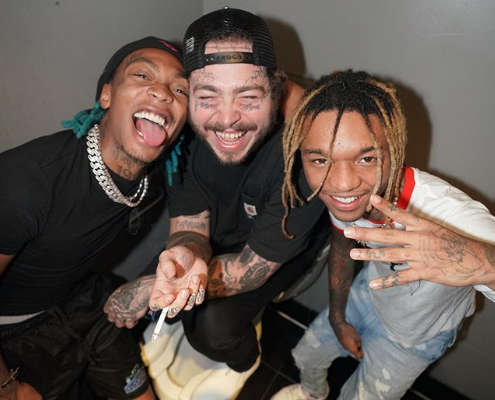Days after her historic night at the 2020 Grammy Awards, Billie Eilish was in trouble.
Or at least to some music fans she was. The 18-year-old appeared in Vogue’s March cover issue, during which she discussed what she saw as the difference between her music and the inspiration behind certain hip-hop songs.
“Just because the story [in my songs] isn’t real, doesn’t mean it can’t be important,” Eilish said. “There’s a difference between lying in a song and writing a story. There are tons of songs where people are just lying. There’s a lot of that in rap right now, from people that I know who rap.”
“It’s like, ‘I got my AK-47, and I’m f******,’ and I’m like, what? You don’t have a gun. ‘And all my b******’ I’m like, which b******? That’s posturing, and that’s not what I’m doing.”
The quote sparked a wave of backlash, but it was later written off as a mostly harmless, out-of-context comment: Eilish was making an off-hand example, and she was specifically talking about artists she knows personally.
But there’s a much deeper history of white musicians — specifically those like Eilish, Post Malone and Miley Cyrus — who have borrowed from hip-hop extensively during their careers — critiquing the historically Black genre.
That dynamic — borrowing while also criticizing — is almost as old as rap music itself. But considering hip-hop is likely as popular today as it’s ever been (as of Feb. 15, the top five albums on the Billboard 200 belong to rappers), there are plenty of important examples from the few years.
Miley Cyrus and the ‘privilege’ of genre-hopping
Just as Billie Eilish featured hip-hop-inspired sounds throughout her debut album, “When We All Fall Asleep, Where Do We Go?,” Miley Cyrus adopted a similar concept for her 2013 release, “Bangerz.”
The album, which earned Cyrus her only Grammy nomination and sold more than one million copies, was executive produced by legendary hip-hop producer Mike Will Made It and featured an arsenal of rappers, including Future, Nelly and Big Sean.
That’s why some fans were angered after the singer partly denounced hip-hop during a 2017 interview with Billboard, when she said she now had trouble listening to certain types of rap lyrics.
“I love [the Kendrick Lamar song, ‘Humble’] because it’s not ‘Come sit on my d***, suck on my c***.’ I can’t listen to that anymore,” Cyrus said. “That’s what pushed me out of the hip-hop scene a little. It was too much, ‘Lamborghini, got my Rolex, got a girl on my c***’ — I am so not that.”
The quote led to criticism from around the internet, including a viral video calling Cyrus “problematic” and her comments “racially insensitive.”
Cyrus responded directly to the backlash in 2019, saying she had come to realize it was a “privilege” to be able to drop in and out of the hip-hop “scene.”
“My words became a divider in a time where togetherness and unity is crucial. I can not change what I said at that time, but I can say I am deeply sorry for the disconnect my words caused. Simply said; I f***** up and I sincerely apologize. I’m committed to using my voice for healing, change, and standing up for what’s right,” she wrote on YouTube.
To understand what Cyrus meant by a “privilege” — one that she, as a white pop artist, may have above others — it’s helpful to look at another controversy, from 2014.
Hip-hop’s origins as a Black genre
The moment came as rappers Iggy Azalea and Azealia Banks were involved in an ongoing social media feud over rap music, questioning who owns it and who deserves to make it. In the midst of their argument, Q-Tip, a rapper, producer and founding member of A Tribe Called Quest, offered his own take on what makes hip-hop a distinctly Black genre.
“HipHop is a artistic and socio-political movement/culture that sprang from the disparate ghettos of NY in the early 70’s,” Q-Tip wrote on Twitter, referring to the music’s origins in New York’s South Bronx, a heavily African American neighborhood where a Black emcee, DJ Kool Herc, introduced the genre at local parties.
Q-Tip went on to tweet about how, over time, hip-hop’s growth became intertwined with inner-city education, the war on drugs and other issues that specifically affected Black communities. Through that process, he explained, rap music eventually became a universal phenomenon.
“@IGGYAZALEA hiphop now was FOR EVERYBODY!!” Q-Tip tweeted at Azalea. “All of those who cld relate to the roots, the spirit, the history, the energy.. It reached YOU.”
The rapper then warned Azalea that she had to “to take into account the HISTORY as you move underneath the banner of hip-hop,” as the genre will always be a “socio-political movement” tied to Black history.
That’s a view reinforced by numerous books, documentaries and historical records, including at the National Museum of African American History & Culture, where there are extensive exhibits on hip-hop’s legacy in the U.S.
Post Malone and the threat of ‘culture vultures’
And it’s a lesson that becomes even more important as white artists like Post Malone, possibly the most commercially successful artist of 2019, offer their perspective on the genre. Malone, a multi-platinum artist has often been accused of “taking advantage” of rap music — disparaging its quality while using its themes, melodies and motifs for his own gain.
“If you’re looking for lyrics, if you’re looking to cry, if you’re looking to think about life, don’t listen to hip-hop,” the 24-year-old said in 2017, suggesting that fans looking for those emotions listen to Bob Dylan instead.
Malone later apologized for those comments, but has gone on to become the subject of several think pieces and interviews exploring his status as a “culture vulture” (one record executive even called him the “Donald Trump of hip-hop“).
Ultimately, artists like Malone, Eilish and Cyrus will probably be popular for years to come. And for good reason: Their music is catchy, adored by millions of fans and resonates with a powerful sense of now-ness that allows it to attract mainstream fame.
But that now-ness also has at least something to do with the genre that listeners are so increasingly reminded of when they turn on the radio — hip-hop. Rap songs, made by Black artists, white artists, Latino artists and more, will likely shape the nature of pop music for years to come, and it’s up to those artists to decide whether they, like Q-Tip, want to acknowledge its history.
Originally Published in Yahoo Sports |Dillon Thompson
In The Know’s Brianna Holt also contributed to this story.





